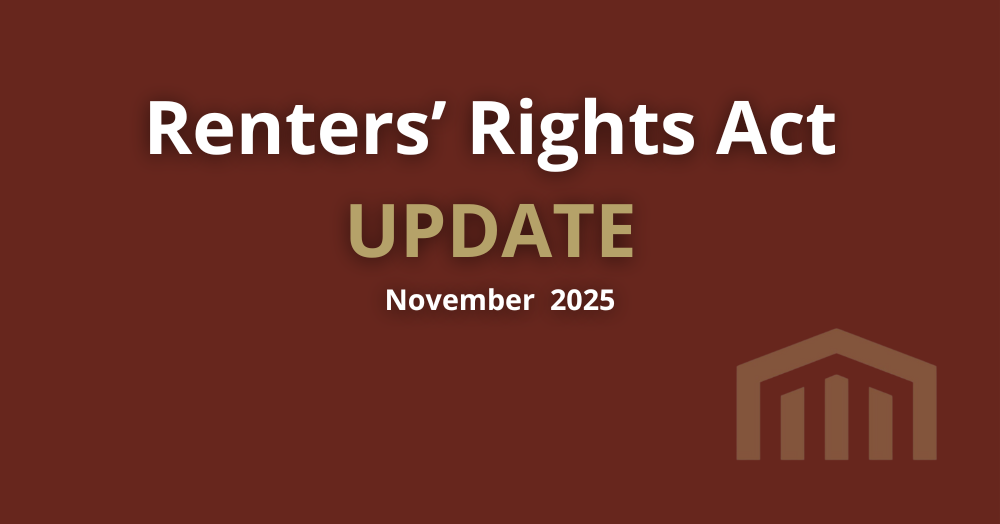
The Renters’ Rights Act Update Implementation Date
The rental landscape is about to see its most substantial transformation in decades. From 1 May 2026, the relationship between landlords and tenants will fundamentally change as the new Renters' Rights Act is implemented.
This legislation aims to create a more balanced, transparent rental sector. Tenants gain new rights and protections, while responsible landlords benefit from clearer rules and a more professionalised environment.
Below is a clear, practical breakdown of what’s changing and exactly when, so you can prepare confidently.
What’s Changing, and Why It Matters
1. End of Section 21 From 1 May 2026 "No-fault" evictions will be abolished. Landlords will continue to be able to regain possession for a valid, legal reason using the strengthened Section 8 grounds, such as needing to sell the property, move in themselves, or for serious tenant breaches.
2. End of Fixed-Term Tenancies All new and existing tenancies will become Assured Periodic Tenancies. This creates a more flexible, rolling tenancy structure. Tenants will be able to end their tenancy by giving two months’ notice, rather than being tied to a fixed date.
3. Clearer Rules for Rent Increases From1 May 2026, rent can only be increased once per year, using the revised Section 13 process.
4. No More Rental Bidding Accepting or encouraging offers above the advertised rent will be illegal. The price you list must be the price you let the property for.
5. Fair Access for Families & Benefit Recipients Landlords cannot have blanket bans or refuse applicants because they have children or receive benefits. However, all applicants will still need to pass the same affordability and referencing checks to prove they can meet the rental payments.
6. Pets: A More Balanced Approach Landlords must consider pet requests and cannot unreasonably refuse. They must respond within 28 days with a valid reason if permission is not given.
Your Key Questions Answered
Q. When will we get the new template tenancy agreements? A. The Government will release a template for new tenancies in January 2026. For existing tenancies, they will publish the mandatory 'Information Sheet' (which you must give to tenants) in March 2026.
For existing tenancies that already have a written tenancy agreement, the agent or landlord will need to provide an information sheet to the tenant telling them about the changes. The UK Government will publish this information sheet in March 2026.
Q. Can I still ask for rent in advance? A. Yes, but only after the agreement is signed. The maximum you can ask for is one month's rent. This rule is designed to stop tenants from having to pay large sums upfront, but it does not affect regular rent collection.
Q. What about Section 21 notices issued before 1 May 2026? A. Any Section 21 notice issued before the changeover date has a cut-off. You will not be able to use it to start an eviction process after 1 August 2026.
Q. Are there new rules for the first 12 months of a tenancy? A. Yes. From 1 May 2026, landlords cannot use the 'sale' or 'landlord moving in' grounds to regain possession during the first 12 months of a new tenancy. This restriction does not affect grounds for rent arrears or anti-social behaviour.
Q. Do these rules apply to all tenancies? A. No. The main exemptions include live-in landlords, purpose-built student accommodation (PBSA) registered with a national code, holiday lets, and tenancies with very high (over £100k) or very low rent.
What Happens When
📍 27 December 2025 Local councils receive enhanced investigatory and enforcement powers.
📍 1 May 2026 – Major Reform Day. Everything below comes into force:
Tenancy & Possession: Section 21 abolished and all tenancies become periodic.
Rent & Advertising: One rent increase per year and no rental bidding.
Tenant Rights: No discrimination against families or benefit recipients.
Documentation: Existing tenants must receive the government “Information Sheet” by 31 May 2026.
Phase Two
📍 From Late 2026 –
Mandatory PRS Database for all landlords and properties.
The PRS Landlord Ombudsman is being introduced and will become mandatory by 2028.
Longer-Term
Decent Homes Standard proposed from 2035/2037.
What Landlords Are Concerned About
It’s natural that some landlords feel uncertain. The most common concerns include stricter tenant selection now that Section 21 is going, and the worry that landlords may leave the sector, potentially reducing supply. While the government focuses on tackling rogue landlords, we know a balance must be maintained to protect good landlords too.
At Putterills, We’re Here to Guide You
For landlords, this is a significant operational shift. It’s a lot to take in, and we know life is busy. That’s where we come in.
We treat every home as if it were our own.
We stay ahead of legislation so you don’t have to, offering practical guidance rather than noise.
If you are a landlord and would like a clear, practical compliance plan for your property or portfolio, please contact us for a confidential discussion.
📞 Call our Lettings Team today: 01462 419333
📧 Email us: lettings@putterills.co.uk 🌐 Visit: www.putterills.co.uk
#RentersRightsAct #Landlords #Tenants #HertfordshireProperty #Putterills #PropertyNews #LettingsUpdate